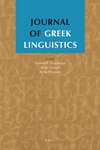The post below was originally published in 2017. It was among a large number of posts that were lost for several years, and I recently recovered it. I have added a brief comment below after the republished post.
 In the first issue of the Journal of Greek Linguistics of 2017, Klaas Bentein examined changes in the way verbal complements were formed between the Classical and Byzantine periods. Here’s what the abstract of his paper says:
In the first issue of the Journal of Greek Linguistics of 2017, Klaas Bentein examined changes in the way verbal complements were formed between the Classical and Byzantine periods. Here’s what the abstract of his paper says:
While Classical Greek has a particularly rich complementation system, in later times there is a tendency towards the use of finite complementation. In this context, Cristofaro (1996) has claimed that the Classical opposition whereby the accusative and infinitive is used for non-factive complements, and ὅτι with the indicative and the accusative and participle for factive ones, is disappearing, ὅτι being used as a ‘generic’ complementiser. In this article, I investigate to what extent Cristofaro’s (1996) claim of the pragmatic neutralisation of complementation patterns can be upheld, and whether it could be claimed that a new pragmatic opposition, in terms of ‘register’, is being established. For this purpose, I turn towards documentary papyri, a corpus which is particularly fruitful for socio-historical investigations.
You can read this article here here. I have added it to the Comprehensive Bibliography of Hellenistic Greek Linguistics.
The title of Bentein’s article is “Finite vs. non-finite complementation in Post-classical and Early Byzantine Greek: Towards a pragmatic restructuring of the complementation system?”
What he calls “complement structure” is referred to as “argument structure” in other theoretical frameworks and “case frames” in still others. These two alternative models both place a strong emphasis on the relations of these complements to the verb with which they appear.
